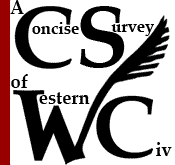Primary Sources for Chapter 12
The Westerner’s Burden: Imperialism and Nationalism, 1810 to 1918
Study Guide | Art History | Links
“New and Improved” Imperialism
The Crime of the Congo by Arthur Conan Doyle: The author of the Sherlock Holmes stories indicts the King of Belgium for cruelty against the people of his colony, the Congo Free State.
Content Question: What does the quoted missionary say about how the rubber collection system works?
Analysis Question: How does Conan Doyle's commentary highlight certain criticisms of the colonial system?
Evaluative Questions: How could a less violent system work?
For the full text see here or here.
Other Sources:
King Leopold's Solioquy by Mark Twain or here: The American humorist also indicts Leopold of Belgium using an imagined speech by the king.
The General Act of the Congress of Berlin or here: The 1885 agreement established the rules by which Europeans occupied Africa. Note especially the beginning (preamble) through article 6, articles 9-12 and 34 through the end.
"White Man's Burden" by Rudyard Kipling, here, or here, with extra commentary here: The author of The Jungle Book offers a defense of Western imperialism in racist and cultural terms.
Roosevelt Corollary to the Monroe Doctrine (abridged): The President’s explanation of his policies of foreign intervention in Latin America in addresses to Congress in 1904 and 1905.
Content Question: Under what conditions would Roosevelt intervene in foreign countries?
Analysis Question: How are the motives behind intervention explained as for the greater good?
Evaluative Questions: How would the peoples on the receiving end of American intervention perceive it?
A fuller version of the relevant parts his 1904 address is here or here or here.
Other contextual views and documents.
Mazzini’s An Essay On the Duties of Man Addressed to Workingmen, selection: the foundational argument for nationalism.
Content Question: How is nationalism supposed to benefit humanity?
Analysis Question: How is Mazzini’s argument connected to socialism?
Evaluative Questions: Given Mazzini’s argument, why does nationalism lead so often to conflict rather than harmony?
The full text of On the Duties of Man is available here.
Report on the Plight of the Macedonian Moslems: A description of suffering during the First Balkan War.
Content Question: What are the atrocities committed?
Analysis Question: What function did the atrocities serve for the attacking troops?
Evaluative Questions: How do these Christian attacks on Moslems compare to the reverse situation today?
Other Sources:
For a map of ethnic divisions in the Balkans, go here.
Young Turk Proclamation for the Ottoman Empire: attempted revolutionaries using Western ideas to revive the "Sick Man of Europe."
Account of the Struggle for Fort Douaumont, Verdun, 20-23 May 1916: A French Staff officer reviews the efforts to retake the fort from the Germans.
Content Question: What tactics and weapons cause casualties?
Analysis Question: How effective is the language of metaphor and comparison in describing the degree of destruction?
Evaluative Question: Why do soldiers continue to fight under these conditions?
Other Sources:
Many documents on World War I are at the World War I Document Archive.
Primary Source Project Links
12. "In Flanders Fields" versus "Dulce et Decorum Est"



